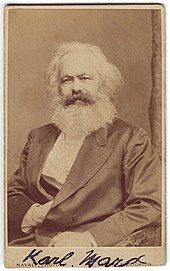The creator of Marxism, Karl Marx is the socialism’s ideologist and the author of the influential work “Capital”.
In the German city of Trier, on May 5, 1818, the future philosopher was born to Heinrich and Henrietta Marx, who were of Jewish ethnicity. His parents were from two sizable rabbinic families. Karl’s father was a lawyer who converted to Lutheranism in order to further his professional life. In 1824, his mother and kids had baptism, which happened seven years after her husband’s. In a big family, Karl Marx was the third child. The boy’s upbringing was greatly influenced by his father, who was a supporter of Kantian philosophy and the principles of the Enlightenment.

Young Karl was first exposed to Renaissance literature and antiquated philosophy by Heinrich’s friend Ludwig von Westphalen. The young man completed his studies in mathematics, Latin, German, Greek, and French at the Friedrich-Wilhelms-Gymnasium in Trier in 1835. He then enrolled at the University of Bonn before moving to Berlin. Philosophy, law, and history were taught to pupils via lectures. Marx developed his own worldview based on his own study of the writings of other philosophers, which drew him to the atheistic and revolutionary features of Hegel’s philosophy.
Karl Marx, at the age of 24, published a dissertation on the analysis of Epicurus and Democritus’ philosophical beliefs under the supervision of Ludwig von Westphalen. Karl Marx was particularly interested in the writings of Feuerbach, Smith, Ricardo, Saint-Simon, and other modern philosophers in addition to classical philosophy.
Political and Social Action
Marx had planned to join the University of Bonn as a professor at the start of his career, but in the late 1930s, the reactionary government started a purge of the university’s faculty in an attempt to crush any communist groups. Marx gave up on teaching after Professor Bruno Bauer was sacked, following Ludwig Feuerbach.
Marx’s “A Contribution to the Critique of Hegel’s Philosophy of Law” was released a year later. A employment at the “Rheinische Zeitung” allowed the young guy to write a political column. The reigning government was strongly attacked by the philosopher. Finally, the authorities became enraged when Marx started advocating for the downfall of the current dictatorship from the publication’s pages. Karl became interested in the topic after realizing that, despite his position as newspaper editor, he knew very little about the workings of political economy.
The younger journalist-philosopher, who is supported by Prussia’s populace, is courted by the ruling class to join them. Marx, however, is unwilling to make concessions to the police state. The young thinker faces forced deportation as a result of his decision. Karl Marx and his family hurriedly left their native country and relocated to the French capital in the fall of 1843.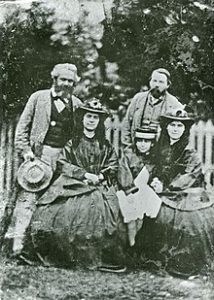
The philosopher met Heinrich Heine, the poet from Germany, and Friedrich Engels, his future collaborator, in Paris. The reformer traveled among radical circles in France for two years. Marx got familiar with the theories of P. Proudhon and M. Bakunin, the founders of anarchism.
Karl Marx relocated to Belgium after 1845. The philosopher joined Engels in the covert international society known as the “Union of the Just,” which was founded in Brussels by German nationals. The two activists were hired by the members of the underground to write the communist society’s program. The “Manifesto of the Communist Party” was penned by Marx and Engels together, and it was first published in restricted print in a London printing company in early 1848.
The communist theoretician Marx is forced to flee Belgium by the government that same year. He spends a month in Paris before returning to Germany. The revolutionary journal “Neue Rheinische Zeitung” is launched in Cologne under the direction of Marx and Engels. However, after a year, the publication is discontinued because workers’ uprisings in the Saxon, Rhineland, and Southwest regions of Germany were put down. Repressions start.
The London Era
Karl’s position with the authorities is compromised by his work for a political newspaper, leading to his family’s emigration to London in the early 1950s. In 1867, the primary work of Marx’s biography, Capital, was published in Great Britain. Marx put a lot of effort into studying a wide range of scientific subjects, with social philosophy, political economy, mathematics, agrochemistry, and mineralogy receiving particular attention. Marx’s family was deeply impoverished at first in London, but his friend Engels soon stepped in to help the philosopher, providing free financial support for the huge family.
First International (also known as the “International Workingmen’s Association”) was founded in 1864, spearheaded by Karl Marx. The core members of the group at first included trade unionists, French socialists, anarchists, and Italian republicans. Marx’s group relocated to New York in response to the Paris Commune’s defeat in 1872, but the community there too vanished after 4 years. The Second International, which carried forth the principles of the First International, didn’t start operating until 1889.
Marxist
The core ideas of Karl Marx’s ideology emerged in the middle of the 1940s. The worldview of the scientist rested on the theories of Ludwig Feuerbach, with whom Marx at first agreed before delving into polemics. The philosopher compiled the ideas of the political and philosophical schools in Germany, England, and France in his own writings. Karl Marx developed a coherent, comprehensive system of ideas on materialism, scientific socialism, and the labor movement based on the material he read.
Historical Materialism
The German Ideology, Marx and Engels’ joint effort, introduced the idea of “materialistic history.” The “Critique of Political Economy” and the “Manifesto of the Communist Party” both included further extensions of this theory. Marx arrived logically at the well-known equation “Being determines consciousness.” The scientist contends that the productive forces of a society serve as the foundation for all other social institutions, including politics, law, religion, and the arts.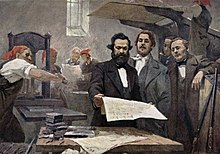
Maintaining equilibrium between the productive forces and productive relations—which, when out of balance, might spark a social revolution—is society’s primary goal. Karl Marx distinguished between the characteristics of the slave, feudal, bourgeois, and communist regimes in his theory of materialistic history. Socialism is the lowest stage of communism, whereas communism proper, which includes the abolition of all financial institutions, is the upper step.
Communism in Science
Karl Marx saw class conflict as the main factor behind social development within the context of the idea of progress in human history. Marx and Engels believed that the proletariat would be the class that brought about the end of capitalism and the creation of a new, global classless society. A global revolution would be needed for this.
Socialism and “Capital”
The book “Capital” is where Karl Marx most completely expounded on his theory of the capitalism economy. With the help of his friend Friedrich Engels, the philosopher’s final two volumes were only released after his passing. The first book was released six years before to the scientist’s passing. Written five years before the first volume of “Capital” was published, Karl Marx’s book “Theories of Surplus Value” was his fourth volume of writings.
The essay’s text highlights the problems with the law of value and the field of capital production. The formulas for labor force, capital, constant and variable capital, and absolute and relative (qualitative) surplus value are developed. Karl Marx’s thesis holds that capitalism always causes economic crises by creating a difference between variable and constant capital. This eventually undermines the system and gradually replaces private property with public property.
Individual Life
Karl Marx encountered the first beautiful woman of Trier when he was still a student. Despite the young thinker being four years older than Countess Jenny of Westphalen, a turbulent affair nonetheless ensued. To protect the young student, the aristocracy turned down several worthy suitors. The young couple had been secretly engaged for six years because the bride’s German aristocratic family did not approve of the aspirational Jewish philosopher and writer. However, this did not stop the couple from being married in Kreuznach in 1843.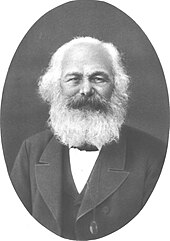
Later, the Marx family was hounded and helped to be finally expelled from the country by Jenny’s half-brother, who held the position of Minister of the Interior for eight years in Prussia. Ludwig von Krosigk, incidentally, was the great-nephew of Karl Marx’s wife and served as the Third Reich’s finance minister before becoming its final prime minister.
Marx’s marriage proved to be very robust and long-lasting. In addition to being his devoted spouse, the philosopher’s wife was also his companion in arms. Jenny was Karl Marx’s book assistant. Four of the seven children born to this devoted couple passed away at an early age. The author’s three daughters achieved fame. Jenny, the oldest, was a journalist, a political activist, and Paul Lafargue’s wife. Laura was Charles Longuet’s wife and a socialist from France. Edward Aveling’s wife was Eleanor. Historians credit Karl Marx with fathering the family’s domestic Elena Demuth’s child. Engels obtained custody of the boy following the death of the philosopher.
Demise
The long-ill Marx’s wife passed away in 1878. Jenny has spent three years fighting cancer. Karl’s loss shattered him, and on March 14, 1883, he passed away from pleurisy. Marx was interred in Highgate Cemetery beside his spouse.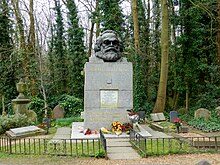
There were ten participants in the parade, all of them were Marx associates. Karl Marx’s unpublished writings were edited by Friedrich Engels, who also had a significant impact on the propagation of Marx’s theories.
